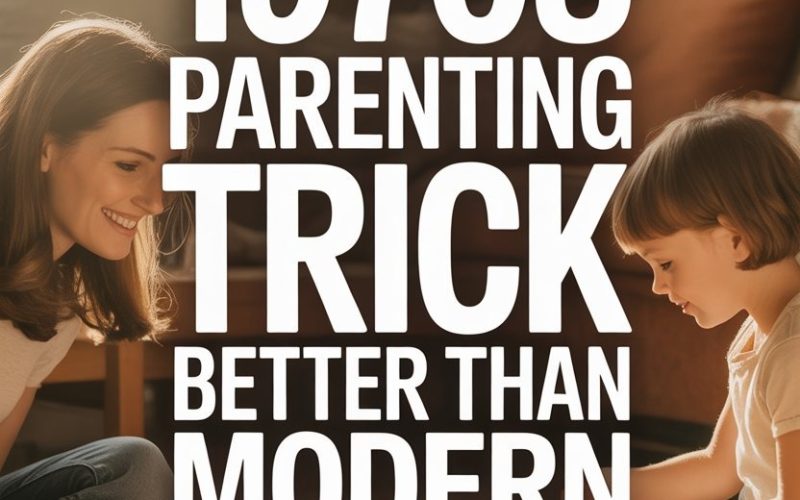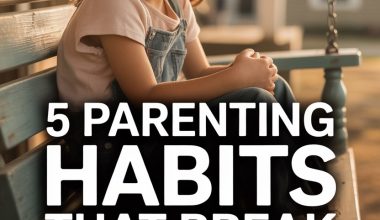There’s something deliciously retro about the parenting style of the 1970s.
Before every home had a device listening in, before you needed a degree to decipher a lunchbox label, mums and dads relied on one incredible trick—and, believe it or not, it might just outrank most of what we’re told today.
It wasn’t screen-time charts. It wasn’t attachment parenting or time-outs on a bespoke rug.
It was simply this: benign neglect.
Let Them Be (Yes, Really)
The golden trick of 1970s parenting was letting children get bored, get dirty, and figure things out for themselves. It meant kicking the kids out into the garden after breakfast with the instructions to be home when the streetlights flickered on.
If you were lucky, your mum might hand you a jam sandwich and a bottle of squash. But the rest? That was up to you.
And here’s the kicker—this worked. Kids developed independence, resilience, and an uncanny ability to entertain themselves with nothing but a stick and a bit of gravel.
Today’s advice, on the other hand, leans heavily on constant engagement, structured play, and vigilance that would impress a CIA agent. But is all that hovering really helping?
The Science of Stepping Back
Researchers at the University of Colorado found that children who enjoy more free, unstructured time develop stronger executive function skills—those essential abilities like planning, self-regulation, and switching between tasks.
Turns out, the unsupervised shenanigans of the ‘70s weren’t just an exercise in parental convenience; they were a brain builder.
Compare that to the modern obsession with enrichment activities and supervised playdates.
Our kids are pros at following adult directions but sometimes freeze like a squirrel in headlights when left to their own devices. Surely, that’s not the dream.
Boredom Isn’t a Crisis
A 1970s parent, faced with a child moaning, “I’m bored!” would respond with the timeless classic: “Good.” Sometimes, if the mood struck, they might elaborate, “Only boring people get bored.”
Today, we hear that declaration and race to Pinterest for a craft involving two toilet rolls, six types of glue, and a level of patience only attainable through meditation and pharmaceuticals.
The old hands just shrugged. Boredom was the mother of invention—and, occasionally, minor property damage.
Psychologists today agree that unstructured boredom actually boosts creativity.
According to Dr. Teresa Belton, a researcher in child development, allowing children to sit with their own boredom fosters imagination and problem-solving skills.
Freedom to Fail (and To Fall Over)
One of the most radical things a 1970s parent did? Allow a healthy dose of failure. If your den collapsed or your bike crashed, sympathy was minimal but so was interference.
That didn’t mean parents didn’t care—they just knew that picking yourself up (sometimes literally) taught lessons that no pep talk could.
Current trends often see us cushioning every fall—sometimes literally, with foam flooring from wall to wall. But learning to fail safely, in manageable doses, builds resilience much more reliably than another round of “everyone gets a sticker.”
Professor Peter Gray at Boston College has written extensively about the “decline of play” in modern childhood and its impact on anxiety.
In short: less freedom, more stress.
Nature as Babysitter
Ask anyone who grew up in the ‘70s, and you’ll hear tales of disappearing for hours to the local park, woods, or (if you were really lucky) a friend’s back garden filled with mysterious objects that definitely weren’t up to modern safety standards.
Parents trusted their kids to roam, and green spaces were their default play zone.
Not only did this encourage physical activity and a love of the outdoors, but it also let kids work out social rules without grown-ups looming over every dispute.
A study from the University of Essex found that unstructured outdoor play lowers stress and increases happiness in children. Not a bad trade for grass stains and the occasional skinned knee.
Sibling Squabbles and Sorting It Out
No one had a “conflict resolution toolkit” in the 1970s. If siblings argued, parents were unlikely to referee. Usually, the advice was something along the lines of “sort it out between you.” And—amazingly—they did.
Modern advice often suggests detailed mediation. But childhood bickering is how kids learn negotiation, empathy, and boundary-setting.
Intervening less actually gives them a better shot at healthy relationships later.
Adults Had Lives, Too
One of the most liberating aspects of vintage parenting? Parents had their own agendas.
Dad might be fixing the car or napping through the cricket. Mum might be reading, working, or chatting on the phone. Kids were expected to entertain themselves, and the world didn’t revolve around their every mood swing.
This didn’t mean ignoring children’s needs. It meant showing them that grown-ups are people with interests, hobbies, and limits—a lesson that sets a brilliant example for self-care and boundaries.
Dirt—Friend, Not Foe
Hand sanitizer hadn’t yet become a daily ritual. Most parents believed that a bit of grime was part of a healthy childhood. Children made mud pies, picked up insects, and shared drinks without a second thought.
All this exposure strengthened immune systems and eased anxieties about germs. Recent research from Newcastle University suggests that too much cleanliness may contribute to allergies and weaker immunity.
Maybe granny had a point when she said, “You’ve got to eat a peck of dirt before you die.”
Saying Yes to Risk
Modern playgrounds look like padded temples to health and safety. In the ‘70s, rusty swings, high monkey bars, and see-saws with a vengeance were the norm.
Children learned early what their bodies could (and couldn’t) do.
A bit of risk, within reason, is healthy. It teaches caution, judgment, and bravery.
Even experts from the Royal Society for the Prevention of Accidents have acknowledged that too much risk-aversion can stunt children’s development.
Why This Works for Busy Parents
Anyone raising kids while working, cooking, and keeping a household afloat knows the siren call of “just give them the tablet.” Stepping away from constant supervision is not just good for kids—it’s sanity-saving for adults.
Embracing a little benign neglect means reclaiming time, rediscovering hobbies, and letting children learn to solve their own problems.
Plus, you’ll never run out of tales about how you survived childhood with nothing but a bike, a mate, and a dodgy sandwich.
How To Channel a 1970s Parent—Tonight
- Send the kids outside with a snack and a ball. Shut the door and give them a rough return time.
- When they announce “I’m bored,” offer a shrug and a smile. Resist the urge to provide a Pinterest-worthy craft.
- If a squabble breaks out, let them work it out unless blood or fire is involved.
- Sit down with a cuppa, a book, or a friend. Let the kids see you as a person, not just a servant on call.
- Resist the urge to over-sanitize every grubby finger. A little dirt adds character—and antibodies.
- Take a deep breath and allow a little risk. Trust them (and yourself) more. It might surprise you.
A New Old Way Forward
The 1970s parenting trick isn’t about ignoring your kids or tossing them to the wolves. It’s about trusting them—and yourself—to handle a bit of boredom, dirt, and disappointment.
It’s a reminder that sometimes, the best way to raise confident, capable humans is to step back just enough to give them space to grow.
Dust off your inner vintage parent and try it out tonight.
You might just rediscover a version of family life that’s simpler, saner, and—dare I say—better than anything you’ll find in a modern parenting manual.




